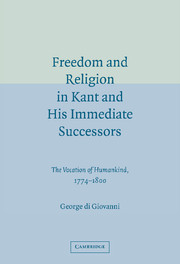Book contents
- Frontmatter
- Contents
- Preface
- Abbreviations
- 1 Introduction: The Vocation of Humankind, 1774
- 2 The Taming of Kant: Popular Philosophy
- 3 The Intractable Kant: Schultz, Jacobi, Reinhold
- 4 Of Human Freedom and Necessity
- 5 Kant's Moral System
- 6 The Difference That Fichte Made
- 7 The Parting of the Ways
- 8 The Vocation of Humankind Revisited, 1800: Conclusion
- Notes
- Bibliography
- Index
1 - Introduction: The Vocation of Humankind, 1774
Published online by Cambridge University Press: 24 July 2009
- Frontmatter
- Contents
- Preface
- Abbreviations
- 1 Introduction: The Vocation of Humankind, 1774
- 2 The Taming of Kant: Popular Philosophy
- 3 The Intractable Kant: Schultz, Jacobi, Reinhold
- 4 Of Human Freedom and Necessity
- 5 Kant's Moral System
- 6 The Difference That Fichte Made
- 7 The Parting of the Ways
- 8 The Vocation of Humankind Revisited, 1800: Conclusion
- Notes
- Bibliography
- Index
Summary
Everything in nature persuades me that righteousness and happiness belong together, and that they also always come together if external circumstances do not disrupt this otherwise so essential a bond. Such a pervasive tendency for order must, however, be fulfilled; and only its realization would remove the confusion and contradiction that would otherwise obtain.
SpaldingTHE THEME
Kant is the most important figure in this book, as one would expect in a work that deals with late-eighteenth-century German philosophy. He is not, however, the only or even its main object of interest. As a matter of fact, Fichte will end up occupying just as much space as Kant. The main object of interest lies, however, in neither of these two philosophers but at the intersection of two themes too broad to consider on their own. One has to do with the reception of Kant between the publication of the Critique of Pure Reason in 1781 and Fichte's publication of The Vocation of Humankind in 1800 – in the period, that is, when transcendental idealism was being transformed either into what eventually came to be known as ‘post-Kantian idealism’ or into that kind of typically German form of scientific as well as religious positivism that took hold of the German philosophy faculties in the nineteenth century. The philosophy of Jakob Friedrich Fries can be cited as a splendid example of this kind of positivism.
- Type
- Chapter
- Information
- Freedom and Religion in Kant and his Immediate SuccessorsThe Vocation of Humankind, 1774–1800, pp. 1 - 31Publisher: Cambridge University PressPrint publication year: 2005

